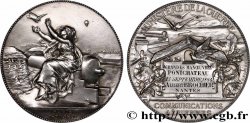E-auction 347-261592 - fme_562820 - III REPUBLIC Médaille religieuse, la Rédemption
得先注册又得到批准才可以报价。为了报价注册. 客户应该得到公司允许,那种过程需要 48 个小时。别等出售结束那一天才登记。您报价的话等于您赞成买那物品,而且按« 保价 » 证明您接受 cgb.fr 因特网拍卖使用法.
报价时只可以出全数值欧元总额。物品描述也说明销售结束时间,结束后出价都不会生效。 报价命令转达有时变动,等到最后秒钟增加否决的可能会。想多了解的话请注意 因特网拍卖常问
购货人不付费
购货人不付费
| 估算 : | 40 € |
| 价格 : | 16 € |
| 最高出价 : | 22 € |
| 拍卖结束日期 : | 09 December 2019 18:36:00 |
| 竞拍人 : | 3 竞拍人 |
种类 Médaille religieuse, la Rédemption
日期: 1912
铸币厂名称/城市 France
材质 bronze
直径 45,5 mm
模子方针 12 h.
硬币制模工 DUPRÉ Georges (1869-1909)
重量 45,44 g.
侧面 inscrite : A M.ELLE M. PERTUSOT-1 FEVRIER. 1912 + Corne BRONZE
印模 corne BRONZE
关于品相的说明
Patine hétérogène présentant des coups et rayures
正面
正面的文字 ANÉPIGRAPHE.
正面的说明书 Saint Joseph agenouillé à droite embrassant les pieds de l’enfant Jésus tenu à bout de bras par la Vierge Marie, tous deux auréolés ; à gauche un autel sur lequel brûle un feu, à droite des moutons; signé : G. DUPRE.
背面
背面的文字 O CRVX AVE / SPES VNICA.
背面的说明书 Saint Jean, vêtu d'une peau de bête en lambeaux, à demi agenouillé à droite devant un autel, tenant un crucifix au-dessus d'une Bible ; du lierre court sur l’autel avec l'inscription en deux lignes ; paysage agricole à l'arrière-plan; signé : G. DUPRE.
评论
Cette médaille, frappée en 1901, fut décernée le 1er février 1912 à mademoiselle M. Pertusot.
Georges Dupré, né à Saint-Étienne le 24 octobre 1869 et mort à Paris en juin 1909, est sculpteur et graveur-médailleur français. Il a été l'élève d'Oscar Roty et de Gabriel-Jules Thomas. Il est membre de la Société des artistes français depuis 1902 ou il obtint une mention honorable au Salon des artistes français en 1893. Il décroche le Premier Grand Prix de Rome de gravure en médailles et pierres fines en 1896.
Au Salon de peinture et de sculpture, il obtient la médaille de troisième classe en 1899, la médaille de deuxième classe en 1901, puis la médaille de première classe en 1904..
Georges Dupré, né à Saint-Étienne le 24 octobre 1869 et mort à Paris en juin 1909, est sculpteur et graveur-médailleur français. Il a été l'élève d'Oscar Roty et de Gabriel-Jules Thomas. Il est membre de la Société des artistes français depuis 1902 ou il obtint une mention honorable au Salon des artistes français en 1893. Il décroche le Premier Grand Prix de Rome de gravure en médailles et pierres fines en 1896.
Au Salon de peinture et de sculpture, il obtient la médaille de troisième classe en 1899, la médaille de deuxième classe en 1901, puis la médaille de première classe en 1904..








 对产品描述纠错
对产品描述纠错 打印
打印 分享我的选择
分享我的选择 提问
提问 Consign / sell
Consign / sell
 产品介绍
产品介绍



